The Snowplow Industry Analysis in North America is estimated to be valued at USD 0.7 billion in 2025 and is projected to reach USD 1.3 billion by 2035, registering a compound annual growth rate (CAGR) of 6.2% over the forecast period.
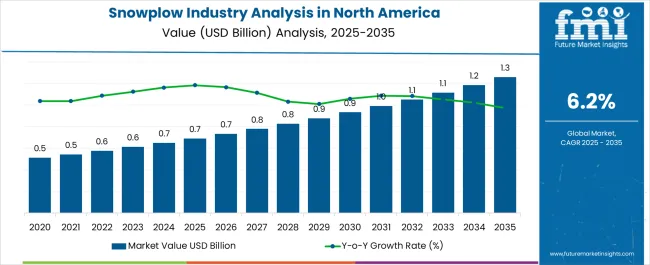
| Metric | Value |
|---|---|
| Snowplow Industry Analysis in North America Estimated Value in (2025 E) | USD 0.7 billion |
| Snowplow Industry Analysis in North America Forecast Value in (2035 F) | USD 1.3 billion |
| Forecast CAGR (2025 to 2035) | 6.2% |
The snowplow industry in North America is witnessing sustained growth due to increasing snowfall variability, urban infrastructure expansion, and heightened municipal and commercial investment in winter maintenance equipment. Current market dynamics are characterized by rising demand from public works departments, transportation agencies, and private contractors, while technological innovations in plow design, safety features, and vehicle integration are enhancing operational efficiency and durability.
The future outlook is shaped by climate-driven requirements for reliable snow management, government funding for road safety, and adoption of advanced materials and hydraulics to improve performance.
Growth rationale is founded on the consistent need for efficient snow removal solutions, the adoption of capacity-specific and material-optimized plows, and strategic distribution through dealer networks and fleet management programs, which collectively are driving higher adoption rates and supporting revenue expansion across municipal and commercial segments.
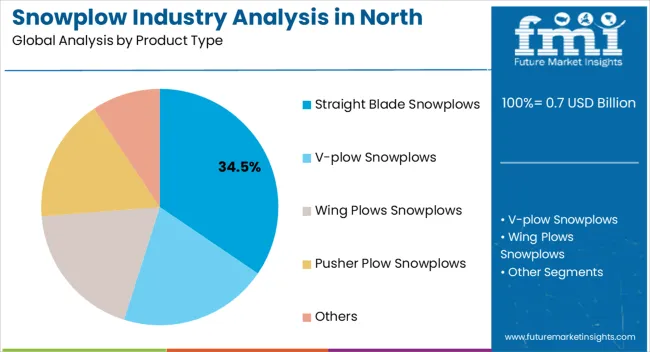
The straight blade snowplows segment, holding 34.50% of the product type category, has maintained a leading position due to its versatility and effectiveness in clearing wide road surfaces. Market adoption has been reinforced by robust construction, ease of maintenance, and compatibility with a broad range of vehicles.
Operational reliability in diverse winter conditions has strengthened preference among municipal and commercial buyers. Manufacturing advancements, including precision fabrication and enhanced hydraulic systems, have improved performance and durability.
Strategic partnerships with fleet operators and equipment distributors have expanded market penetration Continuous innovation and optimization of blade design and operational ergonomics are expected to sustain the segment’s market share and support steady demand growth.
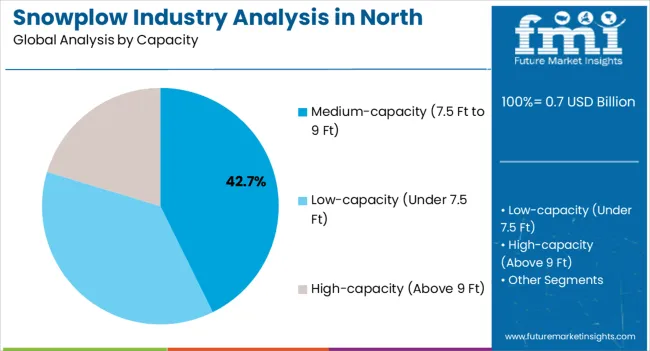
The medium-capacity segment (7.5 Ft to 9 Ft), representing 42.70% of the capacity category, has emerged as the leading choice due to its balance between maneuverability and efficiency for municipal and commercial operations. Adoption has been driven by suitability for a wide range of vehicles, operational flexibility, and cost-effectiveness.
Demand stability has been supported by urban and suburban infrastructure requirements and seasonal procurement cycles. Technological improvements in mounting systems and hydraulic control have enhanced usability and safety.
Market share is expected to be sustained through continued focus on medium-capacity solutions that address both urban road clearing and commercial fleet applications, ensuring operational reliability and long-term adoption.
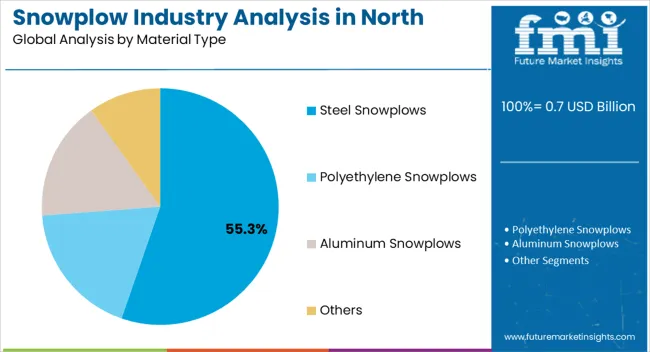
The steel snowplows segment, accounting for 55.30% of the material type category, has led the market due to its strength, durability, and performance in heavy-duty snow removal operations. Adoption has been reinforced by resistance to wear and deformation, suitability for repeated use under harsh winter conditions, and high reliability for municipal and commercial operators.
Manufacturing efficiency, material quality control, and enhanced corrosion protection have further supported market confidence. Distribution through established equipment dealerships and service networks has strengthened accessibility and operational support.
Continued investments in steel treatment technologies and design optimization are expected to maintain the segment’s market share and support steady growth across North American snow removal applications.
United States to Remain the Hotbed for Snowplow Manufacturers
The dominance of the United States in the snowplow industry, holding an impressive 83.4% share, is underpinned by a convergence of factors that set the nation apart in the realm of snow removal. The expansive and diverse geography of the United States encompasses regions with a heightened susceptibility to heavy snowfall, necessitating a resilient and extensive snowplow infrastructure.
This infrastructure, designed to tackle the unique challenges posed by varied climates, contributes significantly to maintaining safe and efficient winter transportation systems nationwide.
The importance of snowplows is further underscored by the sheer size of the United States population, which relies heavily on seamless mobility, even in the face of winter weather challenges. The consistent demand for state-of-the-art snowplow technologies reflects the need to ensure uninterrupted transportation services during adverse weather conditions.
As a result, manufacturers and stakeholders in the snowplow industry continually invest in research and development to introduce cutting-edge solutions that meet the evolving needs of the United States.
The robust and well-established infrastructure within the United States is pivotal in steering continuous advancements in snow removal efforts. Recognizing the strategic importance of efficient snowplow operations, there is a sustained commitment to investing in advanced equipment and innovative solutions.
The impressive 6.7% compound annual growth rate (CAGR) for the United States is a testament to this commitment. It indicates not only a thriving industry but also a proactive approach to addressing the diverse and evolving snow removal needs across the nation.
In essence, the United States stands as a key driving force in shaping the trajectory of the North America snowplow industry. It symbolizes resilience, innovation, and adaptability in the face of challenging winter conditions.
Straight Blade Snowplows Likely to Retain their Dominance in North America
Straight blade snowplows are set to assert dominance in North America, boasting a commendable compound annual growth rate (CAGR) of 5.3%. This trend is reflective of several key factors that position straight blade designs as the preferred choice in the snowplow industry.
The steady growth of straight blade snowplows can be attributed to their versatility and efficiency in addressing diverse snow removal needs. These plows, characterized by a single, straight-edged blade, excel in handling a wide range of snow depths and densities, making them suitable for various snowfall conditions.
Straight blade snowplows are becoming highly popular among snow removal professionals and municipalities seeking cost-effective solutions. This is due to their straightforward design, cost-effectiveness, and ease of operation.
Straight blade snowplows' relatively lower maintenance requirements enhance their appeal to both large and small-scale operations. Similarly, the simplicity of their construction not only reduces the likelihood of mechanical issues but also facilitates easier repairs when necessary. This cost-effectiveness aligns with the budget constraints often faced by municipalities and organizations managing snow removal fleets.
The growth in demand for straight blade snowplows is also linked to advancements in technology and design, enhancing their performance and efficiency. Manufacturers continually invest in research and development to introduce innovations such as adjustable blade angles, improved materials, and enhanced maneuverability, further solidifying the position of straight blade plows in the industry.
The adaptability of straight blade designs to various types of vehicles, including trucks and SUVs, contributes to their dominance. This versatility allows for the integration of straight blade snowplows into different fleets, catering to the diverse needs of both urban and rural snow removal operations.
Snowplows are witnessing significant demand in North America. This is due to ability of their specialized vehicles or equipment to effectively remove snow and ice from roads, streets, highways, parking lots, driveways, and other paved surfaces.
Snowplows typically consist of a large blade or plow attached to the front of a vehicle, such as a truck or a tractor. They are essential in regions with significant snowfall to maintain safe and passable roadways during winter.
Availability of snowplows in different sizes is another key factor expected to boost their sales through 2035. Snowplows come in various sizes and configurations, and they play a crucial role in ensuring transportation safety and mobility in snowy and icy environments.
The North America snowplow industry stands as a cornerstone within the realm of winter maintenance and snow removal. It is playing a pivotal role in ensuring safe and accessible transportation during challenging winter conditions.
The snowplow sector addresses the need for effective snow and ice removal from roads, streets, and various surfaces. It presents a dynamic landscape marked by both growing trends and persistent challenges.
A significant trend shaping the North America snowplow business is the increasing adoption of advanced technologies aimed at enhancing efficiency and sustainability. Players like The Toro Company and Douglas Dynamics are at the forefront, providing innovative solutions that integrate cutting-edge technologies for improved operational efficiency and safety.
The snowplow industry is not without its challenges. Seasonality remains a constant factor, with the demand for snowplow equipment surging during winter months. Budget constraints pose another challenge, requiring strategic planning and investment to meet the diverse needs of municipalities, contractors, businesses, and residential users.
The resilience and adaptability of the snowplow sector are evident in its response to evolving weather patterns and environmental regulations. The diverse strategies employed by companies encompass a range of snowplow types tailored to meet the specific requirements of different users. This adaptability ensures that the industry remains a linchpin in the broader context of winter infrastructure maintenance.
Sustainability emerges as a growing focus within the North America snowplow industry, with an increasing shift toward eco-friendly practices. The adoption of electric and hybrid snowplows reflects a commitment to reducing environmental impact while maintaining efficient snow removal operations. This dual emphasis on sustainability and effectiveness positions the industry to align with evolving expectations and regulations.
Several manufacturers and end users across North America are shifting their preference towards autonomous snowplows. For instance, in 2020, a novel autonomous snowplow (OTTO) was unveiled by Winnipeg Richardson International Airport. It uses GPS, LIDAR, radar, and other sensors for effective working.
Sales of snowplows in North America recorded a CAGR of 4.9% between 2020 and 2025. Total revenue reached around USD 0.7 million in 2025. In the forecast period, the snowplow industry in North America is set to thrive at a CAGR of 6.5%.
| Historical CAGR (2020 to 2025) | 4.9% |
|---|---|
| Forecast CAGR (2025 to 2035) | 6.5% |
The North America snowplow industry witnessed steady growth between 2020 and 2025. This was due to increasing urbanization, coupled with the impact of climate change and heightened emphasis on efficient winter maintenance and snow removal. The industry saw a surge in demand for advanced technologies and innovations to improve the effectiveness and sustainability of snowplow operations.
The future outlook for the North America snowplow industry is optimistic, with an anticipated valuation of USD 1,127.5 million by 2035. This is due to the rising need for resilient winter infrastructure maintenance in the face of unpredictable weather patterns. Technological advancements are expected to play a pivotal role, with further integration of automation, artificial intelligence, and environmentally friendly practices.
Sustainability emerges as a growing focus within the North America snowplow business, with an increasing shift toward eco-friendly practices. The adoption of electric and hybrid snowplows reflects a commitment to reducing environmental impact while maintaining efficient snow removal operations. This dual emphasis on sustainability and effectiveness positions the industry to align with evolving expectations and regulations.
Intensification of Snowfall Pushed by Climate Change is a Pivotal Driver
The increase in snowfall intensity, primarily attributed to the effects of climate change, has emerged as a substantial driver in the snowplow industry. Climate change has led to altered weather patterns, resulting in more frequent and severe snowfall events, particularly in regions accustomed to heavy winter precipitation.
This heightening intensity of snowfall presents significant challenges for maintaining safe and accessible roadways, parking lots, and other surfaces during the winter season. As a result, there is a growing demand for more efficient and effective snow removal solutions, including snowplows.
Traditional methods may prove insufficient in managing the increased snow accumulation and the need for prompt snow clearance. Consequently, this trend drives the adoption of advanced snowplows equipped with innovative technologies and techniques designed to enhance the speed and effectiveness of snow removal operations.
Transportation Infrastructure Development
Transportation infrastructure development holds substantial significance in the snowplow industry. With North America's population rising, the necessity for dependable transportation infrastructure, especially in regions prone to extreme winter weather conditions, has never been more critical. This presents a substantial opportunity for snowplow manufacturers. As municipalities, businesses, and residential areas expand, the demand for efficient snow removal solutions escalates.
By providing advanced snowplows equipped with innovative technologies, companies can address the growing need for dependable winter transportation, guaranteeing the safety and accessibility of roads. This trend positions manufacturers to capitalize on the expanding sector for snowplow solutions, driving industry growth.
Growing Winter Tourism Industry
The expanding winter tourism industry, encompassing popular destinations such as ski resorts and mountainous regions, has a profound impact on the snowplow sales. These destinations heavily rely on snowplows to maintain infrastructure, clear roads, and ensure safe access for visitors. As the winter tourism sector continues to grow, so does the demand for specialized snowplows tailored to the unique requirements of these locations.
Ski resorts, for instance, may invest in snowplows specifically designed for clearing steep slopes and navigating narrow pathways, enabling efficient snow removal in challenging terrain. These specialized snowplows play a pivotal role in the smooth operation of winter tourism destinations, ensuring enjoyable experiences for visitors while contributing to the sustained growth of the industry.
Limited Geographic Scope Due to Seasonal Demand
A notable restraint in the snowplow industry is its inherent limitation to regions experiencing substantial snowfall, which directly influences the potential customer base for manufacturers and service providers. Areas with milder winters or climates that do not frequently require snow removal present significant limitations to opportunities. Companies operating in these regions often contend with a smaller industry size and reduced growth prospects.
The seasonality of snowfall patterns poses challenges for businesses as they must navigate periods of low demand during non-winter months. These geographic and climatic constraints necessitate diversification strategies and innovative approaches for sustained growth in the snowplow industry.
Intense Competition and Price Sensitivity
The snowplow industry in regions like North America, with numerous snow removal service providers, can become intensely competitive, posing a significant challenge. Customer price sensitivity plays a pivotal role as organizations diligently compare prices and negotiate contracts to secure the most cost-effective snowplow services available.
The competitive environment can exert substantial pressure on profit margins, compelling companies to differentiate themselves through added value, exceptional quality, or enhanced operational efficiency. For instance, snowplow service providers must skillfully navigate the balance between offering competitive pricing and maintaining profitability by consistently delivering superior services or other distinguishing factors to remain viable and competitive in this demanding landscape.
The table below highlights the snowplow industry revenues in prominent nations across North America. The United States is expected to dominate the snowplow industry with an expected valuation of USD 1.3 million in 2035.
| Countries | Projected Snowplow Industry Revenue (2035) |
|---|---|
| United States | USD 1.3 million |
| Canada | USD 95.6 million |
The below table shows the estimated growth rates of the United States and Canada. Among these, Canada is expected to witness a high CAGR of 7.1% through 2035.
| Countries | Projected Snowplow CAGR (2025 to 2035) |
|---|---|
| United States | 6.3% |
| Canada | 7.1% |
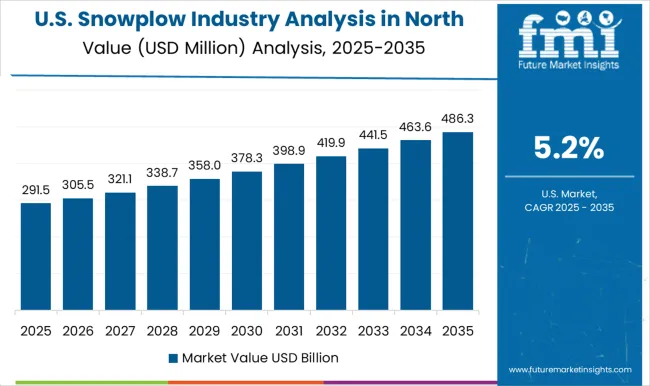
The United States snowplow industry size is forecast to reach USD 1.3 million by 2035. Over the forecast period, sales of snowplows in the United States are set to rise at a 6.3% CAGR. This can be attributed to several key factors that underscore the industry's resilience and adaptability.
One primary driver is the increasing frequency and intensity of winter weather events. The harsh winter events are necessitating adoption of advanced snow removal solutions to ensure safe and accessible transportation across the nation.
The vast geographical expanse of the United States, encompassing regions prone to heavy snowfall, amplifies the significance of a well-developed snowplow infrastructure. Municipalities, state agencies, and private entities are investing substantially in upgrading their fleets with modern and efficient snowplow equipment to address the diverse and challenging snow removal needs of urban and rural areas alike.
The United States population's reliance on uninterrupted winter mobility underscores the critical role of snowplows. As a result, there is a growing demand for cutting-edge technologies in snowplow design and operation, including GPS navigation systems, telematics, and adaptive plowing mechanisms. These innovations enhance the efficiency and precision of snow removal efforts, contributing to the overall industry growth.
Strong presence of leading snowplow manufacturers, such as The Toro Company and Douglas Dynamics, will also improve the United States snowplow industry share. These players play a pivotal role in driving innovation, offering advanced solutions with a focus on safety, efficiency, and sustainability.
Canada is emerging as a highly lucrative pocket across North America. As per the latest report, Canada snowplow demand is poised to expand at a 7.1% CAGR during the assessment period. It will likely attain a valuation of USD 95.6 million by 2035.
Multiple factors are expected to drive demand for snowplows in Canada. These include increasing snowfall and extreme weather conditions, rising infrastructure spending, and rising focus on public safety.
Due to climate change, Canada is witnessing more frequent and intense snowstorms, especially in regions like the Prairies and Atlantic provinces. This is elevating demand for sufficient snow removal devices, including snowplows.
Both governmental entities and private organizations in Canada are making substantial investments in upgrading their snow removal fleets. This is providing impetus for the growth of the snowplow industry.
Rising need for advanced snow management vehicles is set to further boost the target industry in Canada. Subsequently, innovation in snow clearing machinery will foster growth through 2035.
The below section provides in-depth insights into top segments and their respective shares in the North America’s snowplow industry. This information can help companies to invest in popular and demanding products.
| Top Segment (Product Type) | Straight Blade Snowplows |
|---|---|
| Predicted CAGR (2025 to 2035) | 5.3% |
Based on product type, the straight blade snowplows segment is expected to generate significant revenue through 2035. This is attributable to the rising usage of straight blade snowplows in several snow removal applications due to their attractive benefits like simplicity and cost-effectiveness.
Straight blade snowplows are equipped with a single, straight-edged blade that is typically adjustable for angling and height. These snowplows are known for their simplicity and versatility, making them suitable for diverse snow removal applications.
The dominance of straight blade snowplows is reflective of their adaptability to different snow removal needs, from urban streets to larger expanses. The compatibility of straight blade snowplows with diverse types of vehicles is another factor fueling their demand.
Growing preference for straight blade snowplows underscores the importance of efficiency, reliability, and ease of use in addressing the challenges of winter weather conditions. Surging adoption of these snowplows for snow removal applications will boost the target segment.
As per the latest analysis, demand for straight blade snowplows is set to rise at a CAGR of 5.3% during the assessment period. By 2035, the target segment is estimated to reach USD 424.7 million.
| Top Segment (Capacity Type) | Medium-capacity (7.5 Ft to 9 Ft) |
|---|---|
| Projected CAGR (2025 to 2035) | 5.0% |
The sustained high demand for snowplows, particularly in the medium capacity type category, underscores a crucial trend in the snow removal industry. Medium-sized snowplow demand is anticipated to increase with a compound annual growth rate (CAGR) of 5.0%. It will likely total USD 1.3 million by 2035.
One contributing factor to the persistent demand for medium capacity snowplows is their suitability for a wide range of applications. These plows strike a balance between size and power, making them adaptable to various urban and suburban environments.
Municipalities, contractors, and businesses often find medium capacity snowplows ideal for efficiently clearing snow and ice from roads, parking lots, and other communal spaces. Increasing emphasis on proactive winter maintenance strategies is expected to boost the target segment.
Snowplows with medium capacity come in various configurations to suit different needs and budgets. They are becoming versatile workhorses, ideal for clearing moderate snowfall from driveways, smaller roads, and parking lots.
driven by the unpredictability of weather patterns and the imperative to ensure safe and accessible transportation during winter.

North America’s snowplow industry is considered consolidated. A handful of top players hold a substantial 70% to 80% share. This concentration of business share among a limited number of key players suggests a significant level of control and influence exerted by these dominant companies.
Key snowplow manufacturers are focusing on introducing new innovative and high-energy efficiency solutions to boost their sales. They also employ strategies such as acquisitions, partnerships, and merger activities to strengthen their regional and global footprint.
Recent Developments in North America’s Snowplow Industry
| Attribute | Details |
|---|---|
| Estimated Size (2025) | USD 0.7 billion |
| Projected Size (2035) | USD 1.3 billion |
| Anticipated Growth Rate (2025 to 2035) | 6.2% |
| Historical Data | 2020 to 2025 |
| Forecast Period | 2025 to 2035 |
| Quantitative Units | Value (USD million) and Volume (Units) |
| Report Coverage | Revenue Forecast, Volume Forecast, Company Ranking, Competitive Landscape, Growth Factors, Trends, and Pricing Analysis |
| Key Segments Covered | Product Type, Capacity, Material Type, Vehicle Type, Mount Position, Country |
| Regions Covered | North America |
| Key Countries Covered | United States, Canada |
| Key Companies Profiled | The Toro Company; Douglas Dynamics; Meyer Products LLC; Arctic Snow and Ice Control; Hiniker Company; BOSS Snowplow; Curtis Industries; Fallsway Equipment Company; Monroe Truck Equipment, Inc. |
The global snowplow industry analysis in North America is estimated to be valued at USD 0.7 billion in 2025.
The market size for the snowplow industry analysis in North America is projected to reach USD 1.3 billion by 2035.
The snowplow industry analysis in North America is expected to grow at a 6.2% CAGR between 2025 and 2035.
The key product types in snowplow industry analysis in North America are straight blade snowplows, v-plow snowplows, wing plows snowplows, pusher plow snowplows and others.
In terms of capacity, medium-capacity (7.5 ft to 9 ft) segment to command 42.7% share in the snowplow industry analysis in North America in 2025.






Our Research Products

The "Full Research Suite" delivers actionable market intel, deep dives on markets or technologies, so clients act faster, cut risk, and unlock growth.

The Leaderboard benchmarks and ranks top vendors, classifying them as Established Leaders, Leading Challengers, or Disruptors & Challengers.

Locates where complements amplify value and substitutes erode it, forecasting net impact by horizon

We deliver granular, decision-grade intel: market sizing, 5-year forecasts, pricing, adoption, usage, revenue, and operational KPIs—plus competitor tracking, regulation, and value chains—across 60 countries broadly.

Spot the shifts before they hit your P&L. We track inflection points, adoption curves, pricing moves, and ecosystem plays to show where demand is heading, why it is changing, and what to do next across high-growth markets and disruptive tech

Real-time reads of user behavior. We track shifting priorities, perceptions of today’s and next-gen services, and provider experience, then pace how fast tech moves from trial to adoption, blending buyer, consumer, and channel inputs with social signals (#WhySwitch, #UX).

Partner with our analyst team to build a custom report designed around your business priorities. From analysing market trends to assessing competitors or crafting bespoke datasets, we tailor insights to your needs.
Supplier Intelligence
Discovery & Profiling
Capacity & Footprint
Performance & Risk
Compliance & Governance
Commercial Readiness
Who Supplies Whom
Scorecards & Shortlists
Playbooks & Docs
Category Intelligence
Definition & Scope
Demand & Use Cases
Cost Drivers
Market Structure
Supply Chain Map
Trade & Policy
Operating Norms
Deliverables
Buyer Intelligence
Account Basics
Spend & Scope
Procurement Model
Vendor Requirements
Terms & Policies
Entry Strategy
Pain Points & Triggers
Outputs
Pricing Analysis
Benchmarks
Trends
Should-Cost
Indexation
Landed Cost
Commercial Terms
Deliverables
Brand Analysis
Positioning & Value Prop
Share & Presence
Customer Evidence
Go-to-Market
Digital & Reputation
Compliance & Trust
KPIs & Gaps
Outputs
Full Research Suite comprises of:
Market outlook & trends analysis
Interviews & case studies
Strategic recommendations
Vendor profiles & capabilities analysis
5-year forecasts
8 regions and 60+ country-level data splits
Market segment data splits
12 months of continuous data updates
DELIVERED AS:
PDF EXCEL ONLINE
Industry Analysis of Paper Bag in North America Size and Share Forecast Outlook 2025 to 2035
Toilet Seat Industry Analysis in North America Size and Share Forecast Outlook 2025 to 2035
Cosmetic Jar Industry Analysis in North America Size and Share Forecast Outlook 2025 to 2035
Carbon Steel Industry Analysis in North America Forecast & Analysis: 2025 to 2035
North America Booklet Label Market Growth – Trends & Forecast 2023-2033
Injectable Drug Industry Analysis in North America Forecast Outlook 2025 to 2035
North America Cement Packaging Industry Analysis – Trends & Forecast 2024-2034
Palletizing Robot Industry Analysis in North America Size and Share Forecast Outlook 2025 to 2035
Potassium Formate Industry Analysis in North America - Size, Share & Forecast 2025 to 2035
Organic Fertilizer Industry Analysis in North America Analysis – Size, Share, and Forecast Outlook 2025 to 2035
North America Vertical Turbine Pump Market Analysis & Forecast by Head, Material Type, Stages, Power Rating, End-use, and Region Through 2035
Luxury Interior Fabric Industry Analysis in North America and Europe Growth, Trends and Forecast from 2025 to 2035
Home Healthcare Software Industry Analysis in North America Size and Share Forecast Outlook 2025 to 2035
Hardware Asset Management Industry Analysis in North America Forecast Outlook 2025 to 2035
Yoga & Meditation Product Industry analysis in North America Size and Share Forecast Outlook 2025 to 2035
Medium Voltage Transformer Industry Analysis in North America Size and Share Forecast Outlook 2025 to 2035
Walk-In Cooler and Freezer Market Growth – Trends & Forecast 2024-2034
Yoga and Meditation Service Industry Analysis in North Americat Growth – Demand & Forecast 2025 to 2035
Fountain Dispenser Equipment Industry Analysis in North America Growth, Trends and Forecast from 2025 to 2035
North America Returnable Transport Packaging Market Trends – Forecast 2023-2033

Thank you!
You will receive an email from our Business Development Manager. Please be sure to check your SPAM/JUNK folder too.
Chat With
MaRIA